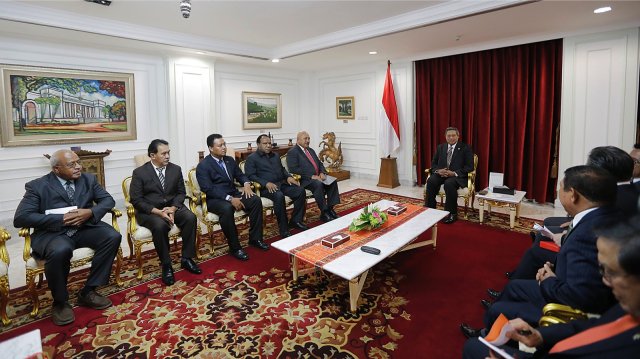
The West Papuan independence movement's hopes of of gaining a foothold in the international community were set back when foreign minsters visiting West Papua pledged non-interference with Indonesia.
Last June, the Melanesian Spearhead Group (MSG) Leaders Summit met in Noumea, New Caledonia, and discussed a membership application from the West Papua National Council for Liberation (WPNCL). The summit postponed the decision until a ministerial delegation visited West Papua to determine the legitimacy of the group and to assess the situation in the occupied country.
Many hoped the visit would shed light on the brutality of the Indonesian occupation and West Papuans' claims for liberation.
On January 13, the delegation arrived in West Papua. It included Fiji's foreign affairs minister Inoke Kubuabola, Papua New Guinea's foreign affairs minister Rimbink Pato, Solomon Islands' foreign affairs minister Soalaoi Clay Forau, and Yvon Faua, a representative from New Caledonia.
The other member of the MSG, Vanuatu, boycotted the visit. Vanuatu has been the most consistent supporter of West Papuan rights.
Vanuatu’s foreign minister Edward Natapei told ABC Radio: “Just one day before we were to depart Vanuatu to travel to Indonesia, we got the program of the visit, which neglected, it did not involve a meeting with civil society, it did not involve a meeting with the West Papuan people, the leadership in West Papua.
“We realised that in fact it was being hijacked by the government of Indonesia to work on another issue, which was to promote economic ties and development cooperation with the government of Indonesia.”
The WPNCL thanked Vanuatu for their stance. Vice-chairperson John Ondawame said: “Stay[ing] only half day in Jayapura without meeting with affected people, particularly [the] resistance movement, the church leaders, tribal councils, women's organisations, the civil society at large.
“This says so clearly to the world that Indonesia is not serious [about] with requests by the MSG, but the Indonesian agenda — not to allow any MSG [foreign] ministers ... to visit West Papua to monitor the current situation on the ground.
In Jayapura, 21 activists were arrested when the delegation arrived. They were taking part in a demonstration welcoming the ministers and urging them to meet with indigenous groups. A request from the delegation to visit political prisoners was denied.
After the short tour, where they were shown development projects undertaken by Indonesia, delegates went to Jakarta to meet with Indonesian President Susilo Bambang Yudhoyono on January 15.
Afterwards, in a joint statement the visitors said: “We respect Indonesia’s sovereignty, unity and territorial integrity as well as the non-intervention principle into a country’s domestic affairs as stated in the United Nation’s charter.”
Rimbink Pato, from Papua New Guinea, said: “As a fellow Pacific country we want to develop economic cooperation in various areas with Indonesia.”
Joe Natuman, Vanuatu special envoy, said: “It has everything to do with Jakarta developing its economic ties.”
Natuman said Vanuatu would not sign any agreement in Jakarta because “West Papua is a different country from Indonesia”.
WPNCL head Andy Ayamiseba said: “In fact, I want the Pacific and world to know that to me and the organisation I represent, that instead of the visit being a fact finding mission, Fiji and the Solomon Islands diverted it to become a promotion of economic ties between Fiji and the Solomon Islands for their cooperation and development advantages with Indonesia.”
Fiji is proving to be the main stumbling block to West Papuan aspirations. A meeting has been called to discuss the outcomes from the delegation, but tensions within MSG could see it delayed.
The meeting will be limited to full MSG members, meaning Indonesia and the WPCNL won't attend. It was under Fiji's chair that Indonesia was accepted as a observer to MSG.
